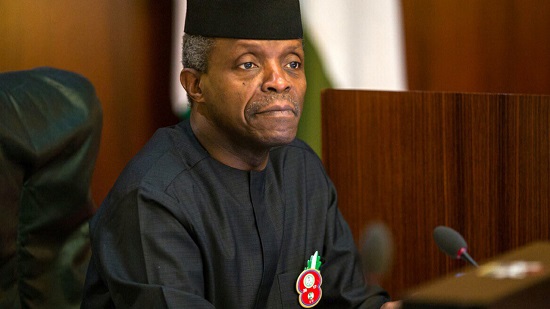This post has already been read 2163 times!
Vice-President Yemi Osinbajo has said the problem of extreme poverty in Nigeria keeps him up at night.
Osinbajo disclosed this at a dinner and interactive session with faculty members, Harvard Business School (HBS) in Lagos.
The vice-president featured alongside Srikant Datar, Professor of Business Administration (HBS), and Bayo Ogunlesi, a Nigerian investment banker, at a question and answer session moderated by Hakeem Bello-Osagie, Chairman of Metis Capital Partners.
“I think what keeps me up at night has to do with extreme poverty; the issue is that the largest number of those who vote for us are the very poor.
“The promises that government makes to them is that their lives will be better and obviously they are looking at their lives being better in the shortest possible time.
“I will like to see Nigeria being an industrialised nation in the next 10 years; a very strong middle class and most people living above poverty line,’’ he said.
Osinbajo said that a lot of government policies were taking into account people at the bottom of the pyramid with a focus on agriculture and getting credit facilities to farmers in order to achieve self sufficiency.
He said that many farmers in the country had been lifted out of poverty by the present administration.
According to him, a lot of attention had also been given to the Social Intervention Programmes (SIPs) which factored the provision of cheap credit to petty traders at the bottom of the pyramid.
The vice-president told the HBS that Nigeria was open to business with its various potentials and urged Nigerian investors abroad to look homewards.
“If you are going to do business anywhere in Africa, it has to be Nigeria.
“This is where you have the energy; you have the drive.
“We are already seeing that kind of activity; business people will always be driven by profit.
“Talent will always go in the direction where it is best rewarded; one can’t afford to be sentimental about that.
“As people see that the environment is getting better for business, they will come back; the opportunities for making huge profits are here.
“Practically everything we are doing is to ensure that there is environment for business to thrive. People are leaving but people are coming back,” the vice-president said.
He said that the federal government, through the Special Economic Zones (SEZ), was encouraging the manufacturers.
The vice-president said that the government was looking at natural economic clusters and had set up shared facilities and power.
He said a lot was going on in the agro-allied sector and of course, resolving the power challenges.
“In the next few months, we will unveil a plan that deals with most of the critical issues in the power sector,’’ he said.
On climate change, Osinbajo said that the momentum was in favour of renewable energy and Nigeria was doing a lot of investment in renewable energy; solar power and opening up opportunities.
On his part, Datar said he was particularly proud of Osinbajo as an academic in governance, adding that academics provide enabling environment for good governance.
He pledged HBS’s support in providing the needed support for human capital development in Nigeria and proffering solutions to tackling Nigeria’s infrastructure challenges.
Speaking, Ogunlesi said that the era of depending on government for infrastructure was gone, adding that the federal government had no business running infrastructure in Nigeria, especially the airports.
In a vote of thanks, the Emir of Kano, Alhaji Muhammadu Sanusi II, called for urgent action to address the high poverty rate in Nigeria especially in the North-west.
He also advocated a committee on girl-child education to boost enrolment in schools and uplift their living standards.
The event also attracted Lagos State Governor, Mr Babajide Sanwo-Olu; US Ambassador to Nigeria, Mr Stuart Symington; a former Minister of Trade and Investment, Mr Okechukwu Enelamah; and former Minister of Budget and National Planning, Senator Udoma Udo Udoma, among others.
(ThisDay/NAN)



